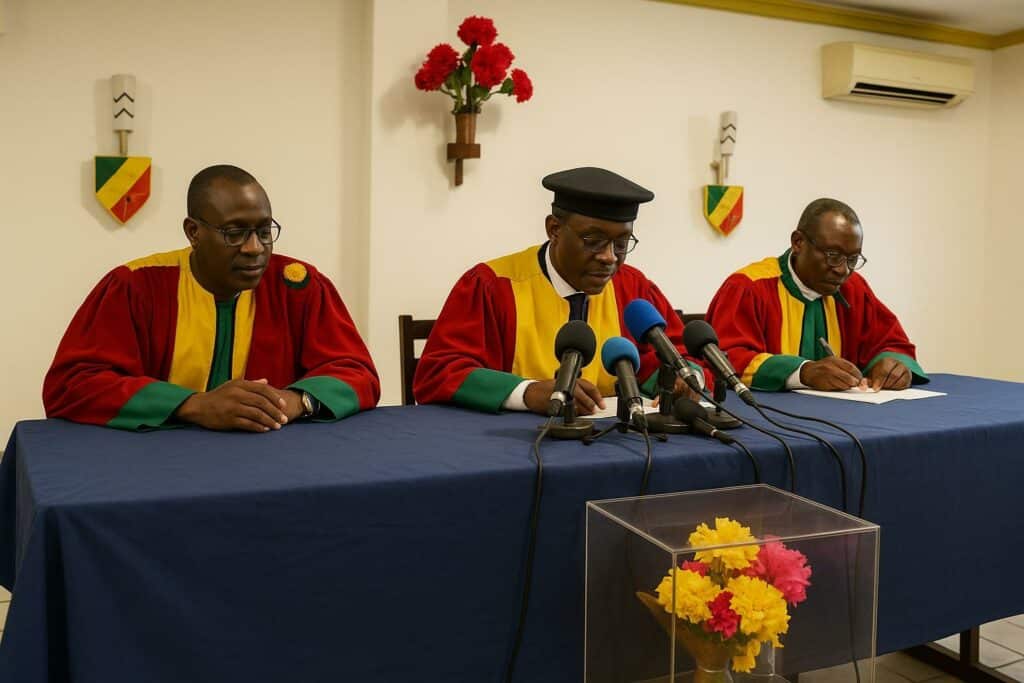Continental Arbitration Spotlight on FECOHAND Vote
Brazzaville’s sporting community woke up on 15 August to a rare intersection of judicial urgency and competitive anticipation. The Congolese Handball Federation (FECOHAND) is scheduled to elect its new executive on 16 August 2025, yet a petition for provisional suspension lodged before the Chambre de conciliation et d’arbitrage du sport (CCAS) may force a pause only hours before ballots are cast. The application was filed by counsel for contender Avicenne Nzikou after the candidate’s list was declared ineligible by the Independent Electoral Commission (CEI) on 14 August. Similar eleventh-hour challenges have arisen in other African sport bodies—most recently within the Ghana Football Association in 2023—illustrating how sports arbitration has become a decisive arena for governance contests (African Sports Law Journal, 2024).
The Legal Labyrinth: From October 2024 Ruling to Present Injunction
The current confrontation is rooted in a CCAS award dated 13 October 2024 that instructed the Congolese National Olympic and Sports Committee (CNOSC) to recalibrate electoral procedures. Counsel for Mr Nzikou argues that the CEI’s formation contravened that award, thereby vitiating the entire electoral timetable. An initial motion to compel compliance was dismissed on 14 August, the arbitral panel inviting the applicant “to better plead his case”, a formula in Congolese jurisprudence that sends parties back to refine legal standing without prejudging merit. The swift return to the same chamber on 15 August underscores the ‘hour-to-hour’ nature of provisional relief in sports matters, a mechanism authorised under Article 49 of the Congolese Sports Code and broadly mirrored in the Court of Arbitration for Sport’s ad-hoc rules (International Council of Arbitration for Sport, 2022).
Stakeholder Positions and the Quiet Role of the State
While public attention centres on the rivalry between the Nzikou camp and incumbent officials, the State has maintained a scrupulously hands-off posture consistent with the government’s 2021 policy note promoting autonomy of sport federations. A senior official at the Ministry of Youth and Sports, speaking off the record, confirmed that “the independence of elective assemblies is integral to our reforms; we trust the arbitral system to resolve disputes.” Such restraint aligns with international expectations articulated by the International Handball Federation, which warns against political intrusion in member elections (IHF communiqué, January 2025). CNOSC President Raymond Obili has likewise expressed confidence that “due process will prevail, allowing our athletes to focus on continental qualifiers later this year.”
Implications for Sport Governance and International Perception
Regardless of the CCAS decision expected on the morning of 16 August, the episode offers a revealing stress-test for Congo-Brazzaville’s sports-governance architecture. A suspension would prolong caretaker management, delaying strategic programmes, notably the roll-out of new youth academies financed through a Franco-Congolese partnership signed in June (Agence Congolaise de Presse, 2025). Conversely, a go-ahead would signal institutional maturity, demonstrating that legal challenges can be incorporated without paralysing federation calendars. Regional observers remember that the Congolese Basketball Federation navigated a comparable dispute in 2021, yet delivered elections within statutory timelines, a precedent that bolstered its credibility with FIBA Africa.
A Federative Crossroads Ahead of Continental Deadlines
Handball remains one of the republic’s most decorated team sports, its women’s squad having reached the semi-finals of the 2022 African Championships. Maintaining momentum is vital as Brazzaville prepares to host a Central African club tournament in early 2026. For athletes and sponsors alike, clarity in leadership is more than a procedural nicety; it is the bedrock of training cycles and marketing contracts. By placing the matter before CCAS rather than ordinary civil courts, stakeholders reaffirm commitment to lex sportiva—an echo of the Olympic Charter’s preference for specialised dispute resolution. That choice also preserves a climate of calm beyond the courtroom, shielding the broader political environment from unnecessary tension.
Awaiting the Gavel: Scenarios for 16 August
Should the arbitral bench deem suspension unnecessary, voting will proceed under the supervision of observers from the African Handball Confederation, and the newly elected bureau will inherit a mandate to pursue institutional modernisation laid out in FECOHAND’s 2024–2028 strategic plan. If, however, the CCAS imposes a stay, the federation will shift into a caretaker phase, during which further submissions will be assessed on the merits. Legal analysts in Brazzaville suggest that a definitive ruling on the substantive complaints could arrive within six weeks—a timeline compatible with preparations for the upcoming African Games qualifiers. In either case, the procedural choreography unfolding this weekend illustrates the pragmatic balance that Congo-Brazzaville continues to refine between judicial vigilance and the imperative of athletic continuity.

